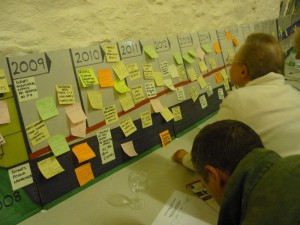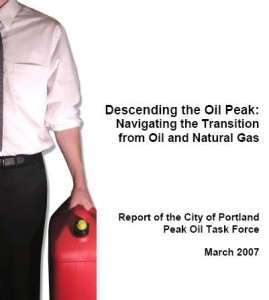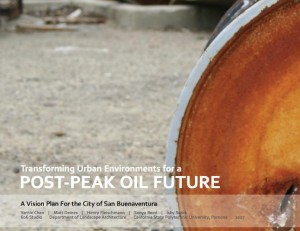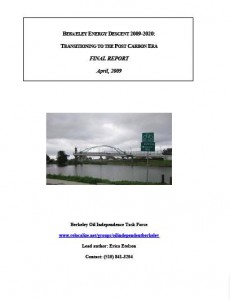23 Jun 2009
A Look at Peak Oil Preparation Plans from Around the World
 My friend Peter asked me yesterday what I thought the collective noun for curmudgeons ought to be (the context for this question escapes me…). I had no response, so he offered his, a ‘misery’ of curmudgeons. Got me thinking, as I am up to my armpits in editing the Totnes Energy Descent Plan, what the collective noun might be for Energy Descent Plans. At the moment, I think a ‘smattering’ is probably the most appropriate. As part of the Totnes research, I have had a good rummage around, helped by the excellent Post Carbon Cities website, at peak oil plans developed thus far around the world. It has been a fascinating process, seeing what’s out there, so I thought I would share it with you. Here is the round up of the plans I have managed to find, whether developed by community groups, local authorities or national government.
My friend Peter asked me yesterday what I thought the collective noun for curmudgeons ought to be (the context for this question escapes me…). I had no response, so he offered his, a ‘misery’ of curmudgeons. Got me thinking, as I am up to my armpits in editing the Totnes Energy Descent Plan, what the collective noun might be for Energy Descent Plans. At the moment, I think a ‘smattering’ is probably the most appropriate. As part of the Totnes research, I have had a good rummage around, helped by the excellent Post Carbon Cities website, at peak oil plans developed thus far around the world. It has been a fascinating process, seeing what’s out there, so I thought I would share it with you. Here is the round up of the plans I have managed to find, whether developed by community groups, local authorities or national government. 
One of the first such plans was the Kinsale Energy Descent Action Plan, developed in 2005 by students at Kinsale Further Education College, which was partly responsible for the formation of the Transition concept. Frustrated at looking around the world for examples of communities taking proactive responses to the peak oil challenge, it set out to see how the town could make the move away from its oil dependency, seeing a huge potential opportunity in these inevitable changes.
The Kinsale report became a viral phenomenon, being downloaded many thousands of times. In spite of just being a student project, it seemed to capture something that other people had also been thinking about. Subsequent plans that relate to responses to peak oil have fallen into four categories. There are those that are local government-led, those that explore the wider impacts of peak oil on society, those that look at solutions in a wider context, mostly national ‘power down’ style responses, and finally there are those which are community driven relocalisation plans, known also as ‘Energy Descent Action Plans’.
Local Government-led Plans
 The vast majority of these have emerged from the US. The first was produced July 2007 in Portland, Oregon, and was entitled ‘Descending the Oil Peak: navigating the Transition from Oil and Natural Gas’, produced by the Portland Peak Oil Task Force . This was a very thorough plan which looked at many aspects of life in the area and how they could be prepared for the end of cheap oil. This was followed by a similar plan for Oakland, “The Oil Independent Oakland Action Plan” , and then in June 2008 the “Vision Plan for the City of San Buenaventura”.
The vast majority of these have emerged from the US. The first was produced July 2007 in Portland, Oregon, and was entitled ‘Descending the Oil Peak: navigating the Transition from Oil and Natural Gas’, produced by the Portland Peak Oil Task Force . This was a very thorough plan which looked at many aspects of life in the area and how they could be prepared for the end of cheap oil. This was followed by a similar plan for Oakland, “The Oil Independent Oakland Action Plan” , and then in June 2008 the “Vision Plan for the City of San Buenaventura”.
 Having looked at many of these, I think the San Buenaventura plan is the best I have yet seen. It is a comprehensive and thorough document that shows what can be done when academics, architects, transport planners and cartographers come together to plan for the move away from oil dependency, although it does have some major gaps in terms of education, healthcare and so on. I certainly found it a very inspiring document.
Having looked at many of these, I think the San Buenaventura plan is the best I have yet seen. It is a comprehensive and thorough document that shows what can be done when academics, architects, transport planners and cartographers come together to plan for the move away from oil dependency, although it does have some major gaps in terms of education, healthcare and so on. I certainly found it a very inspiring document.
 Since then, the San Francisco Peak Oil Task Force and the Berkeley Oil Independence Task Force have produced similar reports, as, in Canada, has the City of Hamilton. A number of City Authorities have also passed resolutions about peak oil and also about climate change, including some in the UK, such as Nottingham City Council.
Since then, the San Francisco Peak Oil Task Force and the Berkeley Oil Independence Task Force have produced similar reports, as, in Canada, has the City of Hamilton. A number of City Authorities have also passed resolutions about peak oil and also about climate change, including some in the UK, such as Nottingham City Council.
Reports Exploring the Wider Impacts
The British Government still takes the position that peak oil is something we need not worry about until at least 2030. Other governments think differently. In 2006, the Irish government commissioned a study about peak oil and its potential impacts on the Irish economy, and in July 2008, the Welsh Government did the same. In July 2008, the Local Government Association issued a report called ‘Volatile Times’ , which explored the impacts peak oil and climate change could have on local governments. It also identified the Transition movement as one of the key responses emerging across the country.
In October 2008, the UK Industry Taskforce on Peak Oil and Energy Security, which comprised leading UK industries such as Virgin, Yahoo and Arup, warned of the major challenge peak oil poses the UK economy, warning that peak oil was likely to occur in 2013, with dire implications for the UK and its business community.
Solutions in the Wider Context
A number of studies have emerged which attempt to design responses to peak oil and climate change on a national level, trying to create a bigger picture response, rather than just focused on one settlement. In 2007 , the Centre for Alternative Technology published ‘Zero Carbon Britain’ , which attempted to design a national energy plan, but which the UK could become carbon neutral in terms of energy generation within 20 years. In 2009, David MacKay attempted much the same thing in his book ‘Sustainable Energy Without the Hot Air’. In terms of food production, Simon Fairlie’s ‘Can Britain Feed Itself’ paper , published in 2007, set out to attempt to see if the UK might be able to feed itself, using organic techniques. This was the first publication to ask this question in depth since 1975.
Energy Descent Action Plans
The term ‘Energy Descent Action Plans’, first used in the Kinsale plan, seems to have stuck for community-led plans that explore the practicalities of moving away from oil dependency. In the ’12 Steps of Transition’ model used by Transition groups , the final twelfth step is ‘Create an Energy Descent Plan’, so many groups are currently building up to creating one. The first plan to follow that of Kinsale was that of Sunshine Coast in Australia, which emerged, like Kinsale, from a sustainability course, and drew up a plan for the surrounding area, although it had a particular focus on training and education (this is not released yet).
 This was followed by Forest Row in Sussex, whose EDAP, called ‘Forest Row in Transition: a community work in progress’, was a shorter document than those outlined above, and took the form of a narrative, a story from 2030. Transition Oxford recently produced the Transport section of an Energy Descent Plan , the rest of which is, as yet, unwritten. Transition Stroud recently wrote a comprehensive paper looking at localising the food system around Stroud , which was adopted to underpin Stroud District Council’s food policies. The Totnes Energy Descent Plan will be the first comprehensive, community-generated EDAP, and many lessons have been learnt in its creation that will be of use other Transition initiatives wishing to do the same. The first draft of the Totnes EDAP should be available for comments within the next month or so.
This was followed by Forest Row in Sussex, whose EDAP, called ‘Forest Row in Transition: a community work in progress’, was a shorter document than those outlined above, and took the form of a narrative, a story from 2030. Transition Oxford recently produced the Transport section of an Energy Descent Plan , the rest of which is, as yet, unwritten. Transition Stroud recently wrote a comprehensive paper looking at localising the food system around Stroud , which was adopted to underpin Stroud District Council’s food policies. The Totnes Energy Descent Plan will be the first comprehensive, community-generated EDAP, and many lessons have been learnt in its creation that will be of use other Transition initiatives wishing to do the same. The first draft of the Totnes EDAP should be available for comments within the next month or so.
I’m sure there will be others I have missed… seen any that really impress you? Let me know…
Peak Oil Hausfrau
23 Jun 2:44pm
Do any of the EDAPs attempt to design for the effects of climate change? For example, transitioning to trees, plants and crops for a drier/wetter/more flood prone/hotter climate?
Linda Hull
23 Jun 5:20pm
I know this is off topic and hope you will forgive me but I need help!
Are you going to Glastonbury Festival? Or do you know someone who is?
There will be a Transition presence in the Mighty Tin Shack in Green Futures.
An Open Space is being held by Transition Glastonbury and Transition Leamington Spa reps. There will be a solar powered cinema and discussion space – come an add yourself to the programme to talk about your initiative, bring your flyers, share skills or any other offer you want to make.
Call Linda on 07772 655035 for directions/more info from wednesday evening.
Hope to see you there, please help us spread the word. The more the merrier.
Please forward to any other Transitioners you know anywhere!
cheers
Linda
Sonya
23 Jun 11:19pm
Ours addresses climate change – we call for mapping and information of the effects and how it will affect our communities in particular (we are a mainly coastal community) where climate change refugees could move too and how we might feed them.
As for adapting to differing growing climates, we are expereincing that now. Floods, raining when it should be the dry season… changes to pest cycles… we’re learning as we go.
Sonya
Leonard Barrett
24 Jun 4:43am
Rob,
The link to the Kinsale plan appears to be broken. Would love to see it if you’re able to fix that!
All the best,
Leonard
Justin - PEDAL Portobello
24 Jun 5:32am
The Transition Group in Portobello, Edinburgh, formed in 2005 as a direct consequence of Eva (Schonveld) being inspired by the work you were doing with the students at Kinsale, Rob, but before the term Transition was being used. For that reason, we called ourselves the Portobello Energy Descent and Land Reform group – PEDAL for short – and have only just got round to changing our name from what everyone thought was a bike campaign, to what sounds like a bike campaign with a location! (PEDAL – Portobello Transition Town).
We created our EDAP in 2005 (http://pedal-porty.org.uk/energy/energy-group/) so I’m not quite sure (but would be curious to know) where that fits in to your timeline of the sequence in which EDAPs were created – or even the timeline of when Transition groups were formed (although I know the official sequence is to do with when people asked the Transition Network to formally recognise them, the formal bit being a really useful way of focusing groups minds on whether they are ready to take this path).
The 2005 PEDAL EDAP seemed to get buried for a while from early 2006 when Eva, the boys and I went to live on the Isle of Eigg for a while; the group became very effectively focused on particular projects and events, and has gone from strength to strength on these. Of the original 12 core members almost all are as fully – or more fully – involved now as they were in 2005, others have joined, and membership and activity has increased dramatically with the new Orchard and other projects. We are in the process of revisiting and recreating the EDAP now so these links are really handy.
Land Reform was as central a part of our approach right from the start as energy descent: community ownership of local resources being seen as crucial for energy descent to be possible. I’d be curious to know whether you and other folk down south see this as important to you too, or whether it is something that only makes sense in the Scottish context (given the hugely successful push for land reform here). Likewise, is effectively interacting with the national political level only possible up here, or is it something that can be done (is being done?) down south. Up here, the £27 million Climate Challenge Funding for community carbon reduction initiatives was secured by the Scottish Green Party by virtue of having a Parliament that has fair voting and so has to respond to the people. I guess, I’m also curious about how you and others down south see community initiatives like Holyrood 350 (www.holyrood350.org) that seek to take a Transition approach (being unashamedly positive about what we can all do, and unashamedly definite about what will happen if we don’t do it!) and seek to apply it at a national level. Enough – should I post this, or just appreciate the thinking your post provoked . . . hmmm. . . I guess if it appears in the posts, then . . .
Rob
24 Jun 7:23am
HI Leonard.. I have fixed the Kinsale link. Justin, thanks for your comments.. good points all. I didn’t include the PEDAL one because I’ve still not actually seen it! Thanks for the link, I will check it out. It does of course hold a significant place in that chronology, it just slipped my mind (if anyone else has done one and I have forgotten to include it, please take Justin’s tack of telling me about it…).
The Climate Challenge Fund would make such a difference down here… we asked Ed Milliband about it when we saw him at the conference, and he said ‘come and talk to me’ which we will.. it is also part of a list of ‘Big Asks’ we made to the Department of Communities and Local Government.
Land reform, yes I think there will be elements of it, but not on the scale that you have managed there… thanks!
Rob
Cliff
24 Jun 9:14am
Hi Rob
You misrepresent the Transition Oxford Plan – the chapter on Transport is in mid-process; the report you link to is one contribution amongst many, by an academic with very little contact with the rest of the initiative.
Sadly this is not made clear enough within the report.
Since it was compiled there have been workshops with local transport enthusiasts and professionals, and an ongoing process of synthesising and and refining all inputs.
Will be posted online in draft form as soon as coherent enough.
Cliff,
Transition Oxford
Rob
24 Jun 9:33am
Hi Cliff, thanks for that.. I stand corrected.. it was forwarded on to me as being part of the EDAP. Do keep us posted…
Best wishes
Rob
Clifford J. Wirth, Ph.D.
26 Jun 3:53am
The transition groups should plan for a rapid energy descent and economic collapse, meaning no transportation and no food coming in from “the outside” within a few years.
Look at this analysis of oil production: http://www.theoildrum.com/node/5395
Take a look at the actual net oil produced, see Figure 3 here: http://netenergy.theoildrum.com/node/5500
And then consider that the oil exporting nations are significantly reducing exports to us in developed nations.
These data indicate that we will experience a very fast descent starting now.
For this reason, it is wise to focus on Peak Oil preparations that anticipate a collapse in food and agricultural tools, machines, fertilizer, seed, hardware, wire, medicines, and heating.
http://survivingpeakoil.blogspot.com/2008/07/surviving-in-northeast-usa-after-last.html
Thanks for listening, Clifford J. Wirth, clifford dot wirth at yahoo dot com.
Graham
26 Jun 10:02am
I think the Mayo Energy Audit produced by the Sustainability Institute should be included- an excellent analysis of the likely indigenous energy likely to be available to the people of Co. Mayo with different scenarios over the next 20 years. Gives detailed figures for energy demand and supply, both fossil-based and non-fossil. Also covers food, land use etc..
http://www.sustainability.ie/energyplan.html
Justin - PEDAL Portobello
26 Jun 4:51pm
Rob, Thanks for that. Quick thought: would it be useful to have a research report from up here on the impact of the CCF so that you can use that to help argue your case with Ed Milliband? It’s work I’m just about to embark on alongside a couple of other crucial projects, but will prioritise if tha is useful (justinkenrick AT yahoo.co.uk).
Marina
26 Jun 4:54pm
Rob,
The link ‘the city of Hamilton’ points to Berkeley Energy Descent Plan. Would it be possible to correct this? Thank you.
Véspera de nada » Blog Archive » Lugares do mundo que se están a preparar para o teito do petróleo
28 Jun 6:42pm
[…] semana puiden ler un artigo de Rob Hopkins no seu blog Transition Culture no que fai un moi bo repaso aos lugares do mundo que se están a preparar para o impacto do cénit […]
Manoel
28 Jun 7:56pm
Hi, Rob. You say your government is still denying the proximity of peak-oil but don’t you think these news http://www.guardian.co.uk/business/2009/jun/21/brown-emergency-plan-for-oil mean they are changing their minds?
Thanks for this great post. I’ve made a review for http://www.vesperadenada.org (in Galician language).
Véspera de nada » Blog Archive » Gordon Brown reclama un plan urxente para evitar que o prezo do petróleo rache coa recuperación económica
28 Jun 8:13pm
[…] nos lembraba Hopkins o día 23. Se cadra Hopkins aínda non escoitara as noticias cando publicou ese post: Brown demands emergency […]
sarah Edwards
30 Jun 2:11am
So good to see this info on communities that are developing or have developed an EDAP, either grass roots or govt. Sustainable Claremont (CA) has a very comprehensive energy descent plan. It doesn’t address food production or security, but it was developed by citizens, including professionals citizens and has been adopted by the city govt. See hte plan at http://www.ci.claremont.ca.us/ps.quicklinks.cfm?ID=2267
They then proceeded to engage the entire community in implementing the plan, which is when they consulted Transition US and I was referred to help them launch their group and to speak at their unleashing. In visintig their site you will see they have incorporated Transition concepts in their stucture and are moving ahead impressively. They are currently in the process of deciding on whether to become an offical Transition Initiative.
Chris Peeters
10 Jul 9:06am
I was interested in the plan of the city of San Buonaventura.
However, when I click on the site (and when I google on the title of the plan) I get the message the page is not available.
Have you by any chance still the pdf-version of the plan?
Many thanks, kindest regards,
Chris Peeters
TT Nijmegen (Holland)